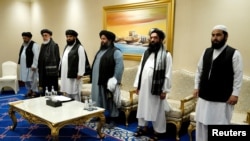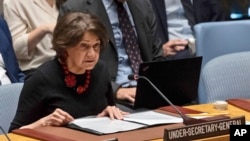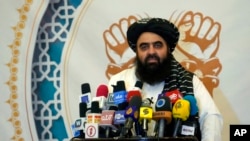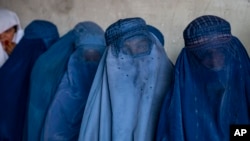Afghanistan’s Taliban rulers stated their intention Wednesday to join a United Nations-organized meeting in Doha on June 30 that aims to facilitate and coordinate the world’s engagement with the country hit by a multitude of crises.
The announcement came a week after a senior U.N. diplomat visited Kabul and extended to the de facto authorities “an advance invitation” to participate in the two-day conference of special envoys on Afghanistan.
The international event will be the third Afghanistan-centered gathering in Qatar's capital since U.N. Secretary-General Antonio Guterres initiated the process in May 2023, aiming to increase interaction with Afghanistan “in a more coherent, coordinated and structured manner.”
Zakir Jalali, a senior Taliban foreign ministry official, said in a “keynote speech” to its staff in the Afghan capital that “representatives of the Islamic emirate will take part in the main discussions” in Doha. A ministry spokesperson posted details of his remarks on X, formerly known as Twitter, on Wednesday.
Jalali stated that a formal decision to attend the “Doha III” meeting would be announced later. He defended the Taliban’s decision not to join the previous two meetings, saying that any “symbolic participation would have been futile” for Kabul as the organizers had refused to accept its conditions and address objections over the agenda.
“However, the agenda for the third Doha format meeting has changed positively, and there are no significant differences regarding the topics of the discussion,” Jalali noted. He explained that the upcoming meeting would discuss financial and banking-related problems facing Afghanistan, alternative livelihoods for poppy growers, and climate change impacts on the country.
Jalali said the Taliban foreign ministry was waiting for the U.N. to share the latest details about the Doha huddle to enable Kabul to send its delegation there.
Rosemary DiCarlo, the under-secretary-general for political and peacebuilding affairs, visited Afghanistan from May 18 to 21, where her discussions with Taliban Foreign Minister Amir Khan Muttaqi, among others, centered on the June 30 meeting.
The Taliban had asked the U.N. in the run-up to the second Doha meeting in February that their delegates would be accepted as the sole official representatives of the country, meaning that Afghan civil society activists and members of opposition groups would not be present.
De facto Afghan authorities also sought a meeting between their delegation and the U.N. at “a very senior level,” saying it “would be beneficial.” The Taliban also opposed the planned appointment of a U.N. special envoy to coordinate international engagement with Kabul in line with the latest U.N. Security Council resolution on Afghanistan.
However, Guterres rejected the Taliban conditions while briefing reporters at the end of the second Doha meeting.
“These conditions, first of all, denied us the right to talk to other representatives of the Afghan society and demanded a treatment that would, I would say, to a large extent be similar to recognition,” the secretary-general argued.
It was unclear immediately whether the U.N. would relax those conditions to allow Kabul’s delegates to attend the upcoming meeting despite their controversial governance in poverty-stricken Afghanistan.
The Taliban have imposed sweeping restrictions since taking power in August 2021, including a ban on girls attending school beyond the sixth grade and prohibitions on many Afghan women’s access to employment and public life at large.
De facto Afghan leaders, who are ethnically Pashtun, have also rejected international calls for giving representation to other ethnicities in the government, saying all groups are represented in it.
The elusive Taliban supreme leader, Hibatullah Akhundzada, insists he is governing the country in line with local culture and Islamic law and dismisses international criticism of his policies as an interference in the country’s internal affairs.
Afghan rights groups and activists have criticized the U.N. for inviting the Taliban to the upcoming Doha meeting, saying it would embolden the Taliban to further tighten their curbs on women.
U.N. spokesperson Stephane Dujarric, while responding to the criticism, told reporters in New York on Tuesday that his organization continues to engage with the Taliban “because they are the de facto authorities in Afghanistan.”
Dujarric emphasized that the U.N. is persistently urging the Taliban to uphold the rights of women and girls, as well as advocating for increased humanitarian aid for the Afghan people.
“We’ve invited envoys on Afghanistan to attend a meeting in Doha … to bring some clarity and consistency to the way the world deals with the situation in Afghanistan while continuing to put the human rights of women and girls at the forefront,” he said.
Separately on Tuesday, in her address to a U.N. Security Council meeting, DiCarlo cited Afghanistan as a “crying example” where women and girls are systematically denied rights and dignity, particularly in education. “Women in Kabul aspire to the same opportunities as men and seek international support to realize their rights and contribute to their country’s future,” she stated.
U.N. agencies describe Afghanistan as one of the world’s worst humanitarian crises, where more than two-thirds of the estimated 40 million population needs assistance following years of conflict and natural disasters. In recent weeks, hundreds of Afghans have died in flash floods triggered by climate change-induced heavy seasonal rains, which displaced more than 80,000 people.
The Taliban’s return to power in August 2021 invited international financial and banking sanctions on the country, worsening economic and humanitarian conditions.







